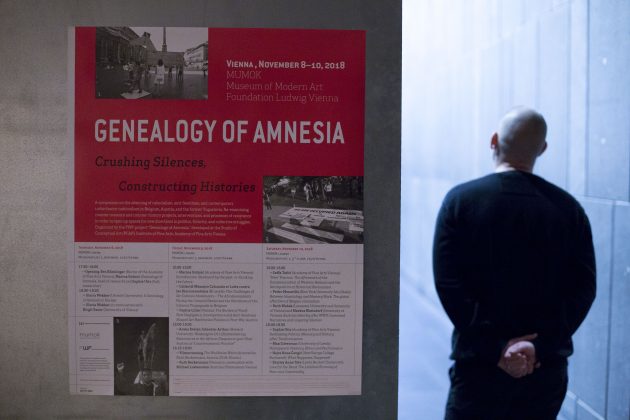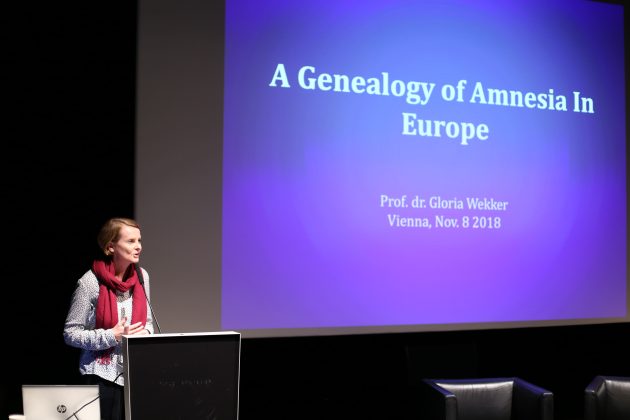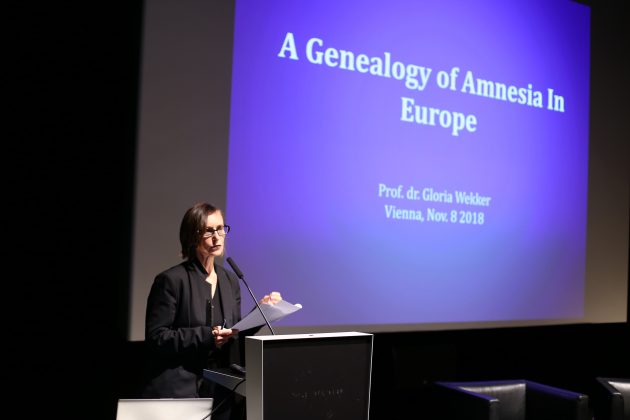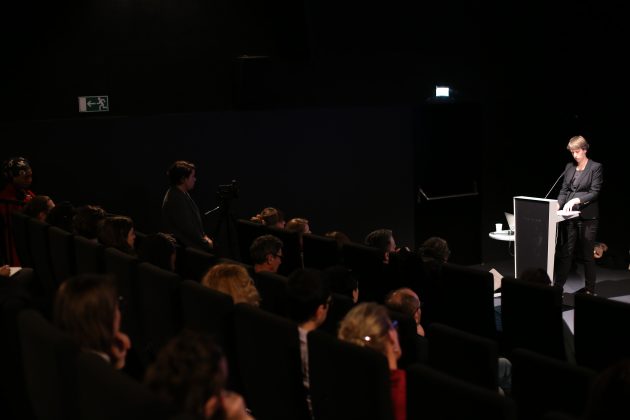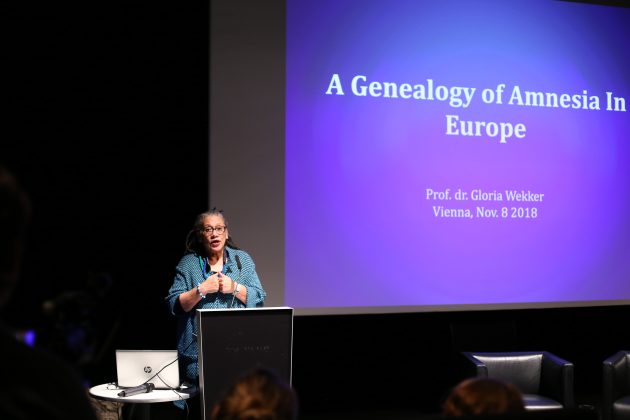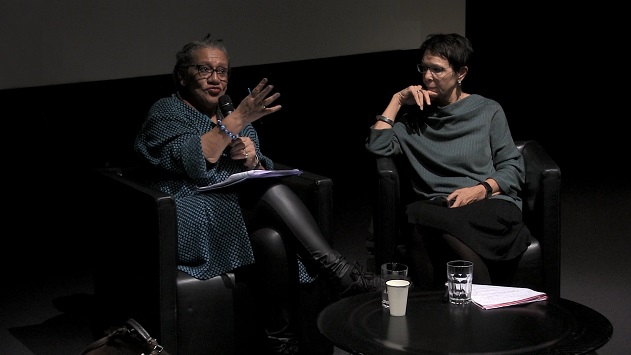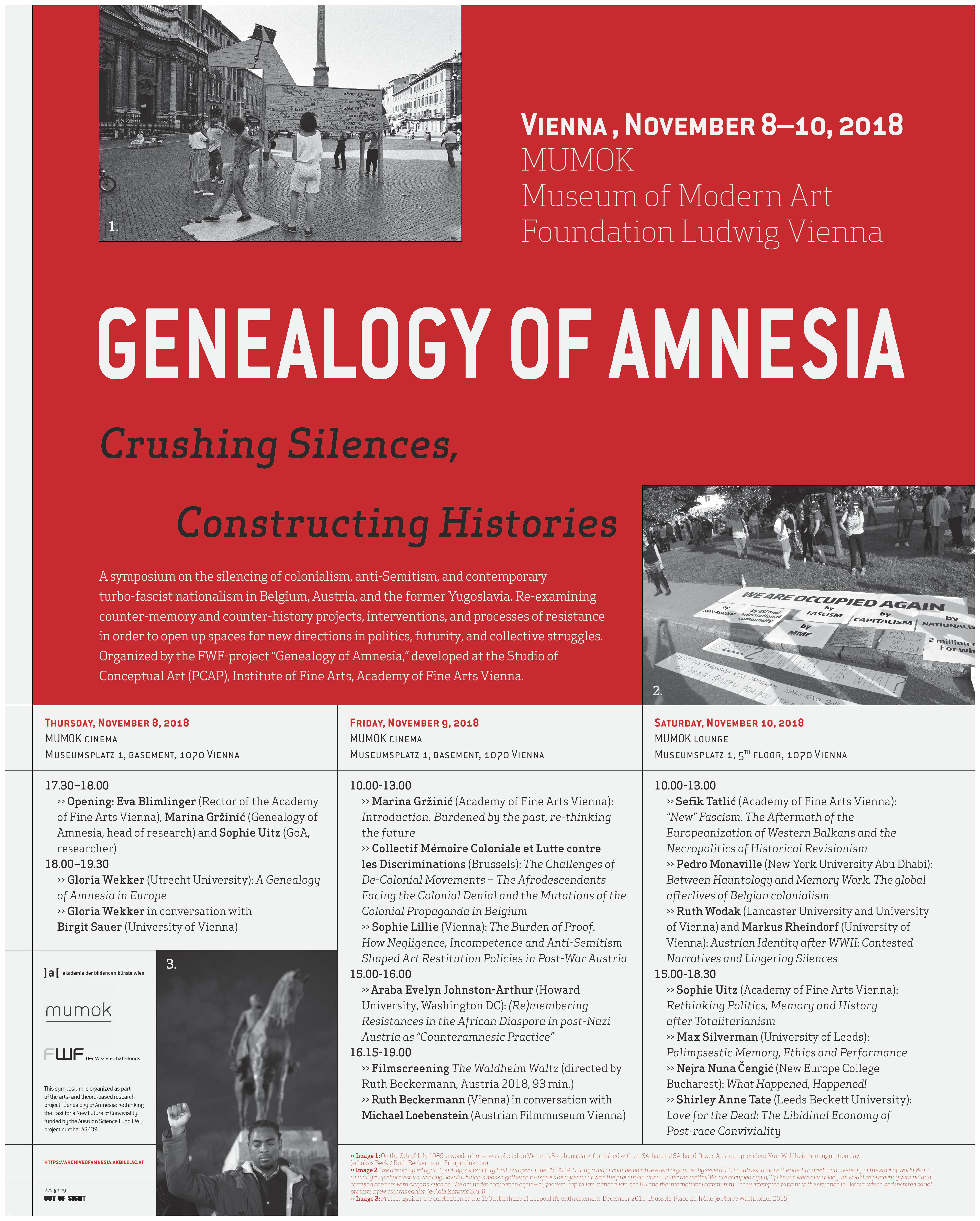2020: BUILDING NEW VOCABULARIES OF RESISTANCE
Screenings, lectures, performative interventions
Digital LAB/Zoom
Österreichisches Filmmuseum
November 11 and 12, 2020
The art-research project “Genealogy of Amnesia” (FWF-PEEK Project, Academy of Fine Arts Vienna) in cooperation with Österreichisches Filmmuseum andkulturen in bewegung, an initiative by VIDC, Vienna, announces a collaborative two days of screenings, lectures, performative lab situations onto the topic of evaluating film and video languages to oppose discrimination, epistemic violence, invisibilized realities, lost memories, and closed archives. The two days lab situations will be going on with filmmakers, curators, students, and the younger generation of film and video artists and Viennese activist communities. New film languages will be discussed through processes of changing established narratives and imperial knowledge.
The first part is a two afternoons Digital LAB/Zoom-presentations by Tjaša Kancler (Barcelona), Saša Kesić (Belgrade), Christoph Kolar (AT), İklim Doğan (Turkey/AT), Mika Maruyama (Japan/AT) and Mai Lin (AT), Marissa Lobo (Brazil/AT) and Nevline Nnaji (USA/Germany).
The second part is a two-night screening program at Österreichisches Filmmuseum with films by Selma Doborac (AT), Nevline Nnaji (USA/Germany), and Morgan Quaintance (UK).
The collaborative film program presents a coming together of several partners: the Österreichisches Filmmuseum,the project “Smashing Wor(l)ds: Cultural Practices for re/Imagining & un/Learning Vocabularies,” supported by Creative Europe and led by kulturen in bewegung, an initiative by VIDC, and the art-research project “Genealogy of Amnesia” (FWF-PEEK Project AR 439, Academy of Fine Arts Vienna). It will be two days of intensive encounters of inspiring program of experimental, profoundly defiant film practices that oppose injustice, xenophobia, and systematic racist exclusions. (M. Gržinić)
For full symposium program and details click here
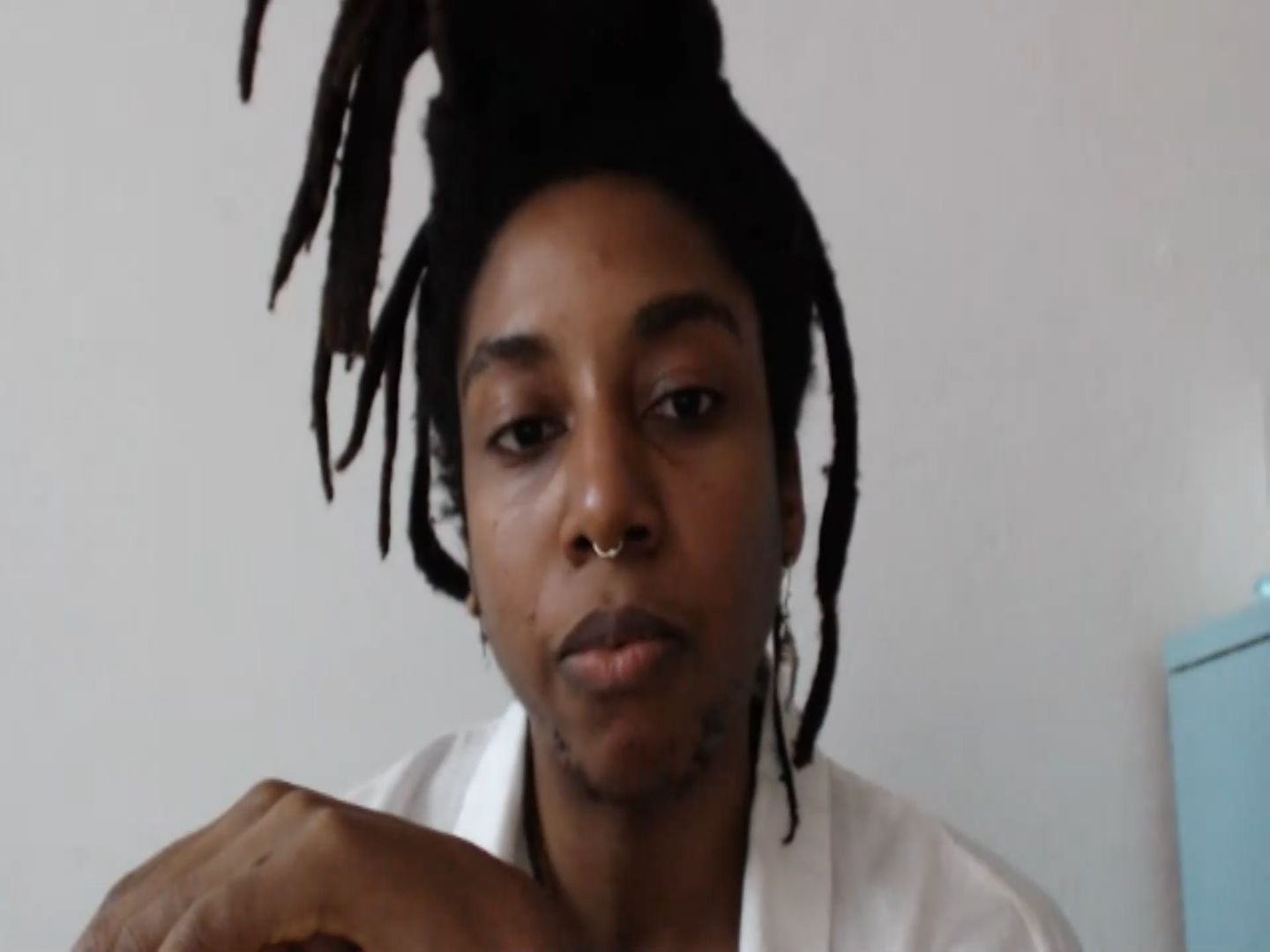
Venline Nnaji 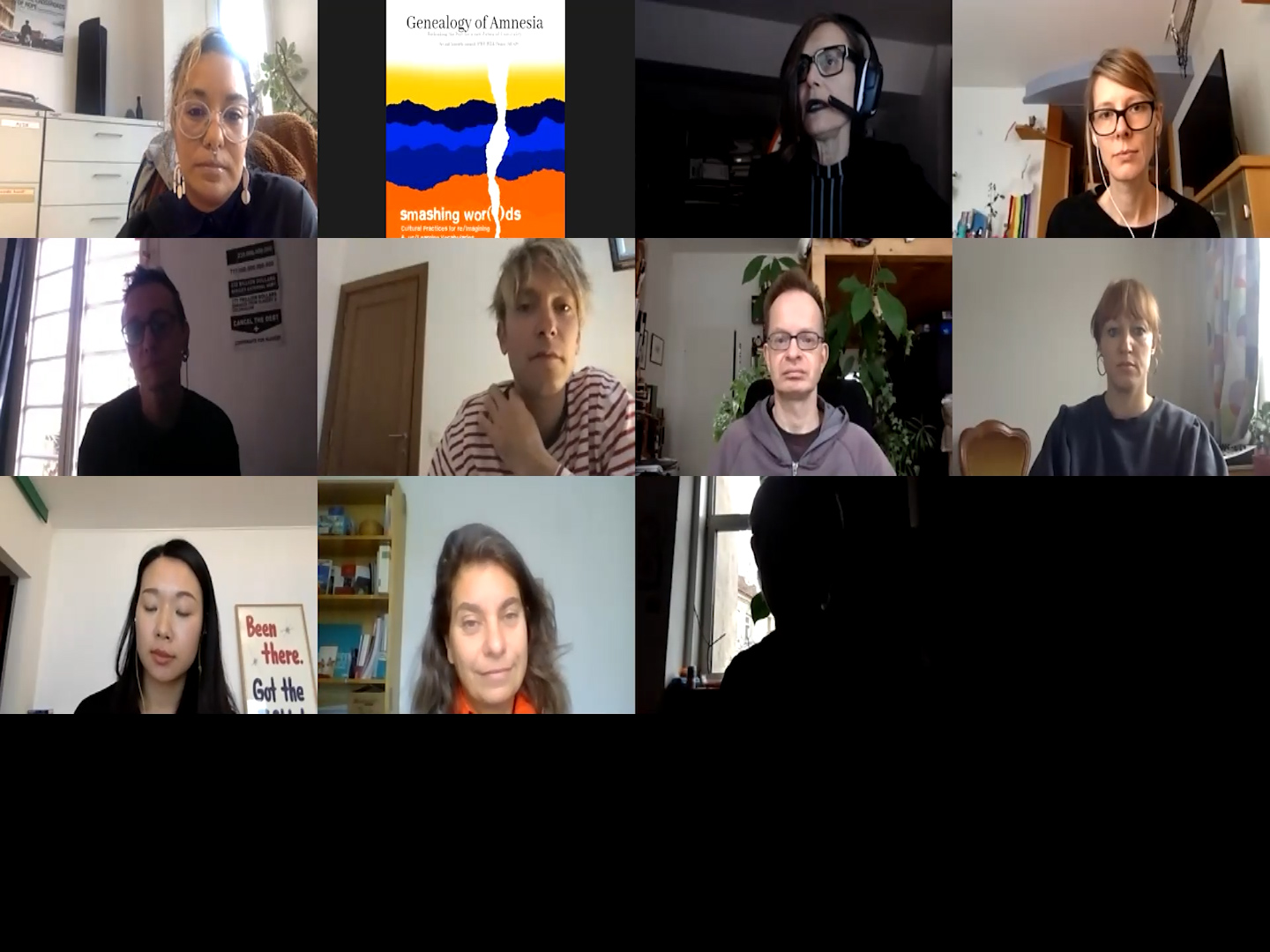
Presentation by Nevline Nnaji 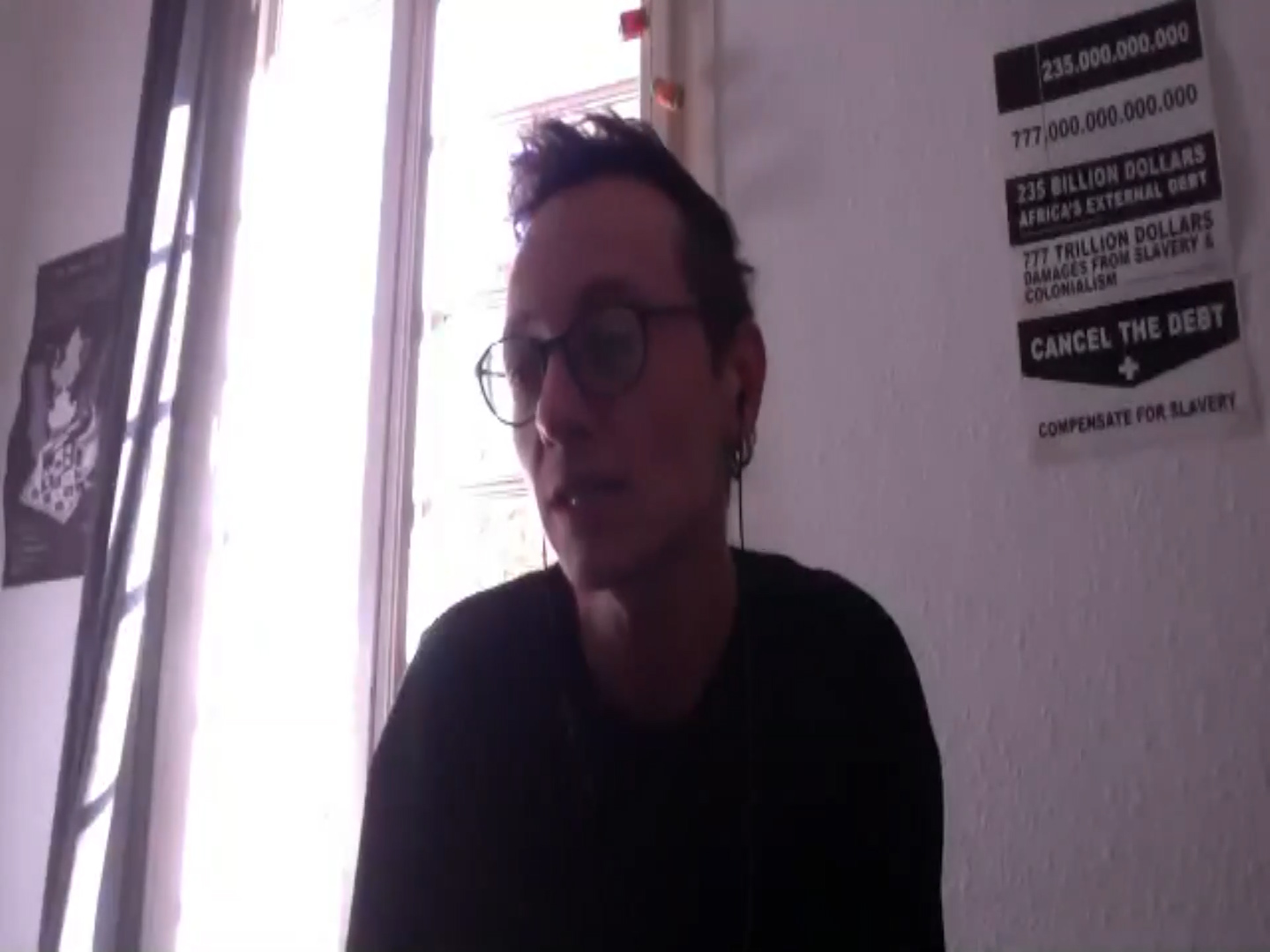
Tjasa Kancler 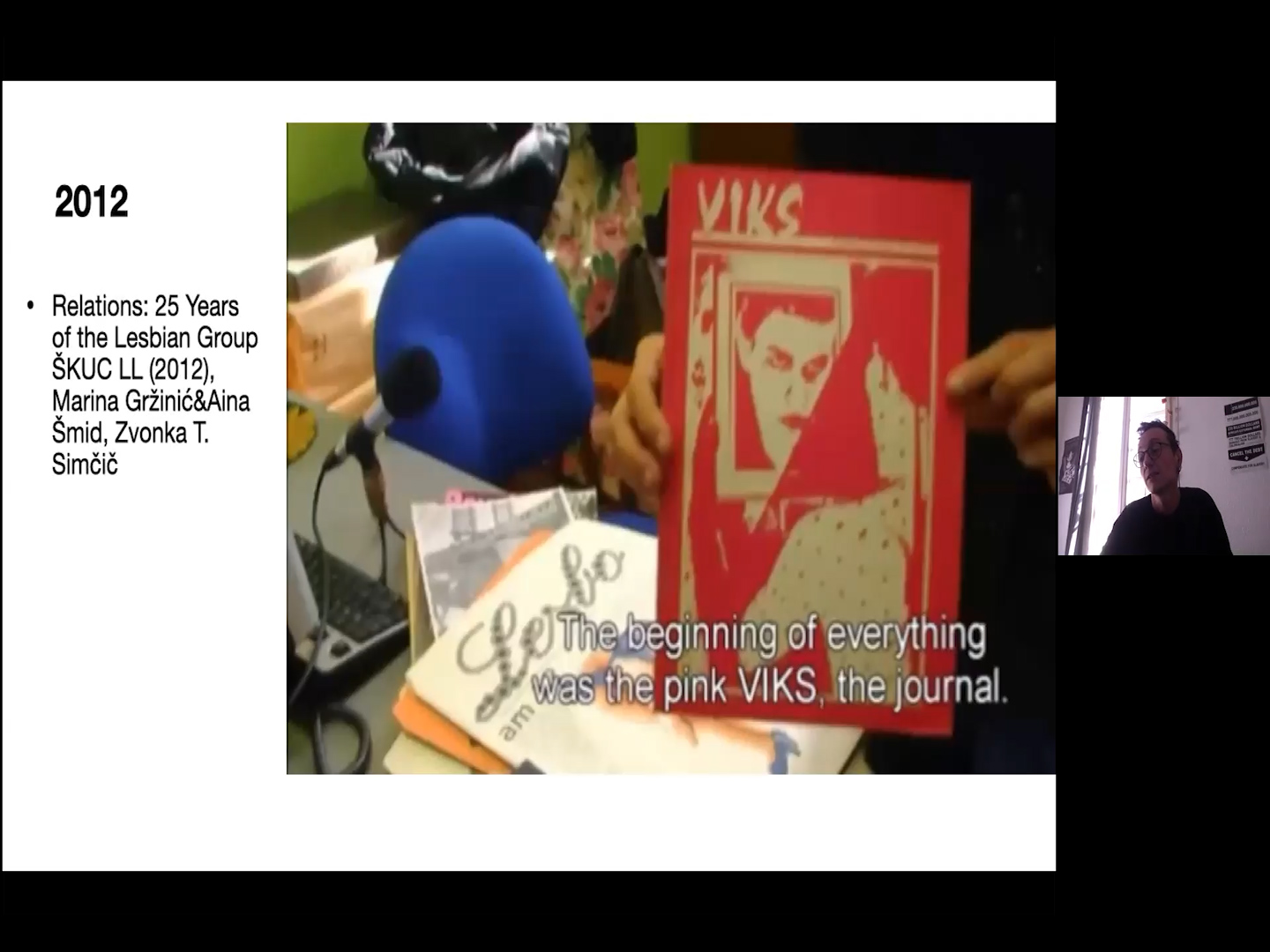
Presentation Tjasa Kancler 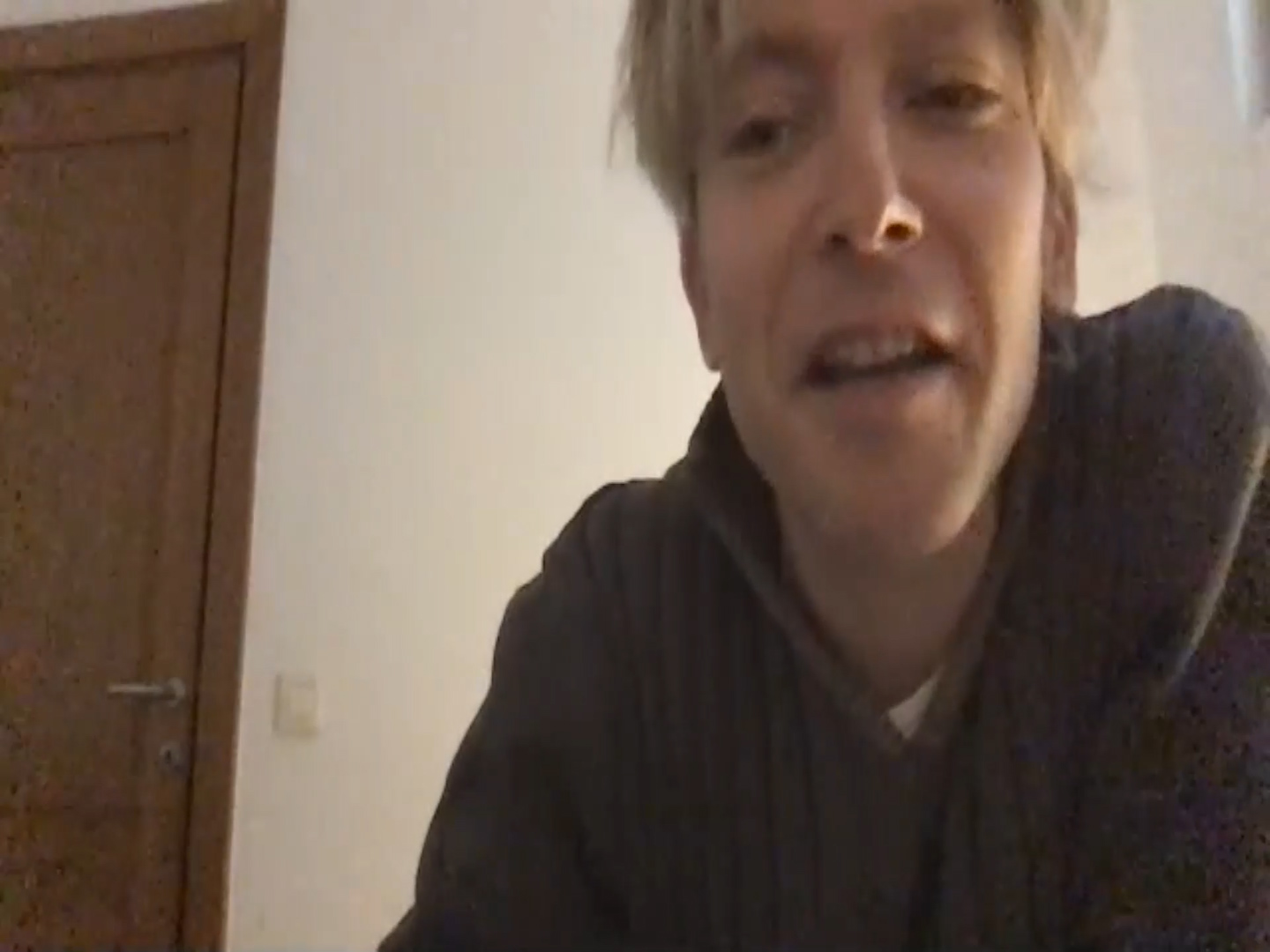
Sasa Kesic 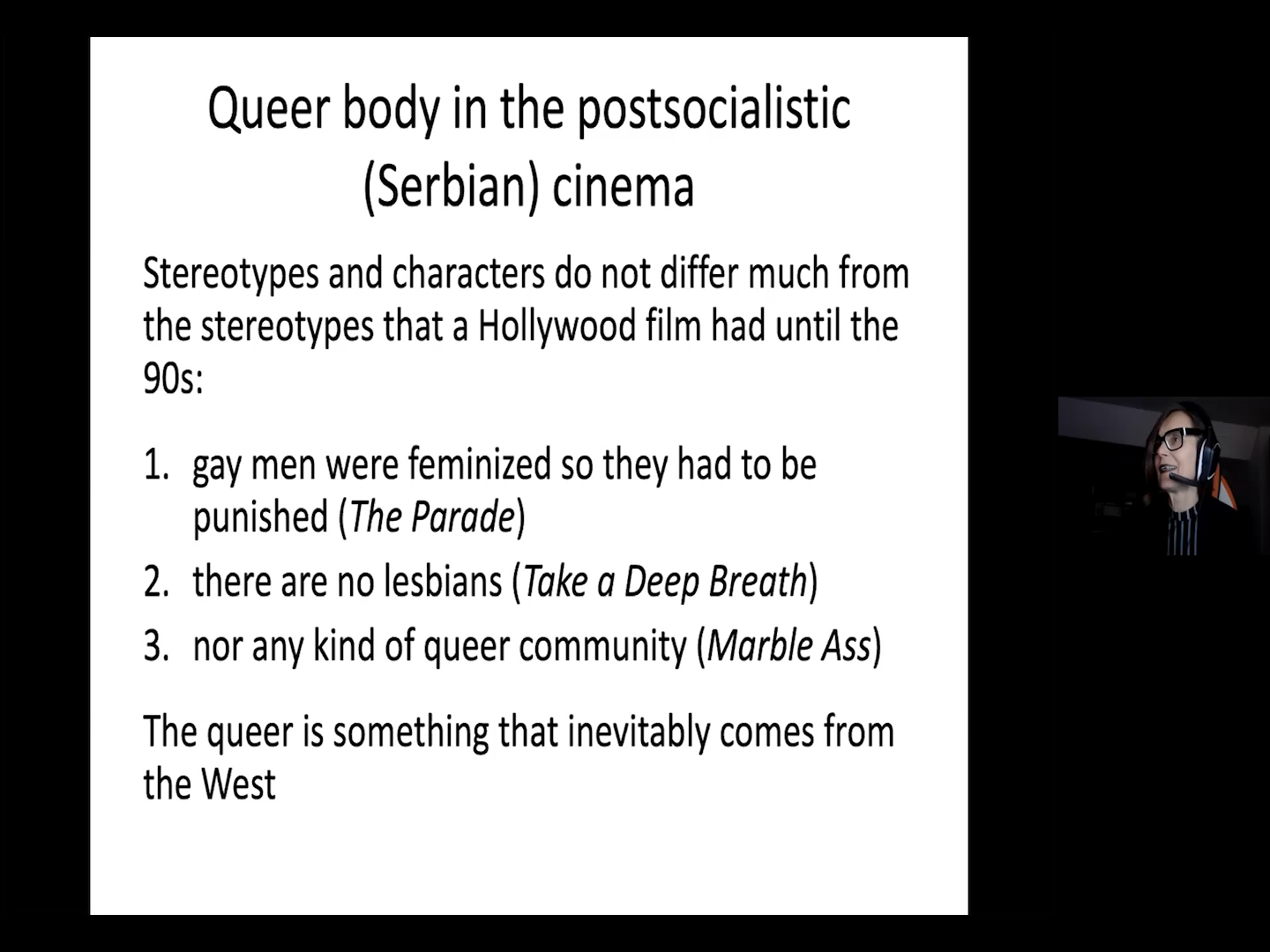
Presentation Sasa Kesic 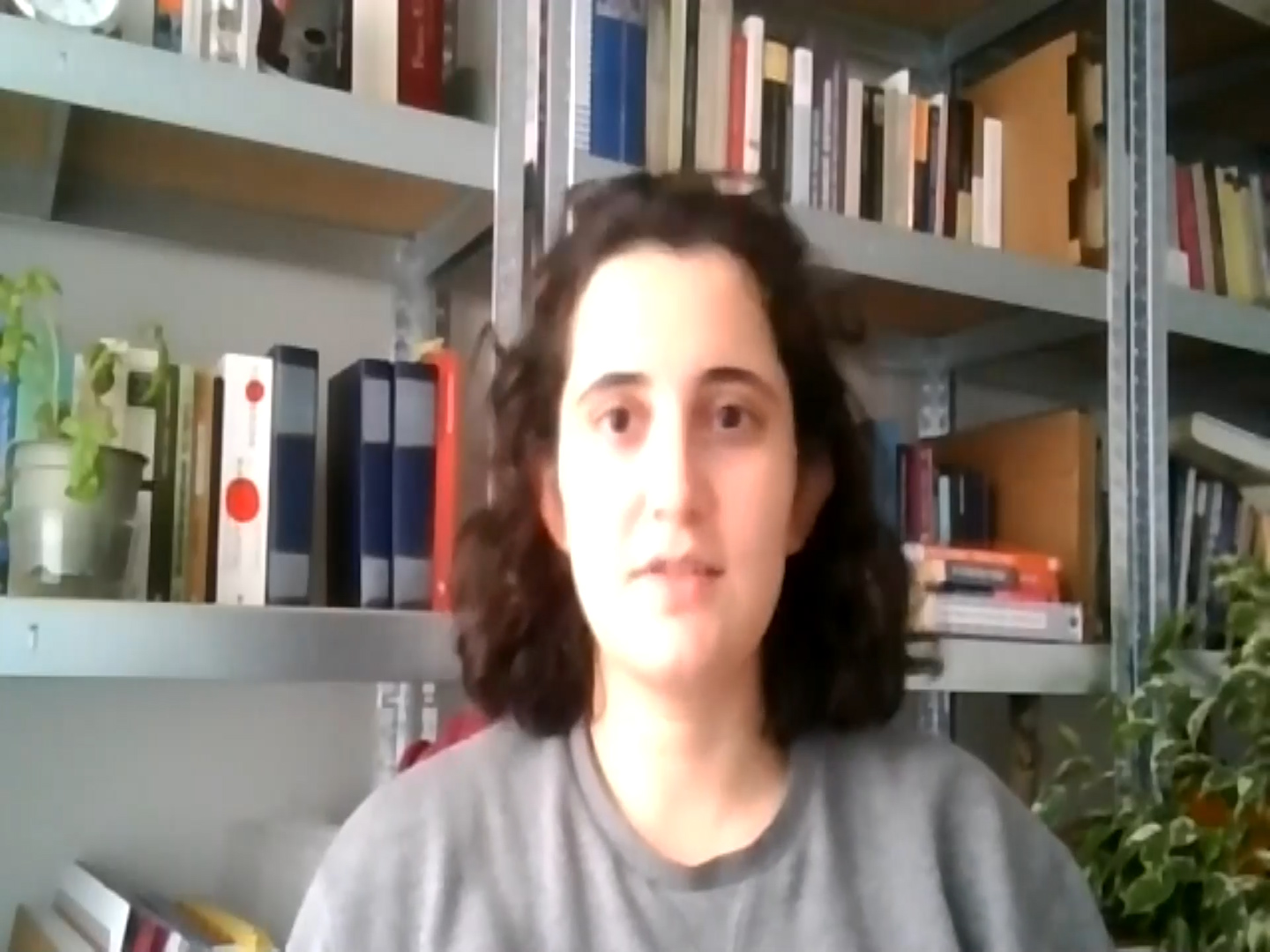
Iklim Dogan 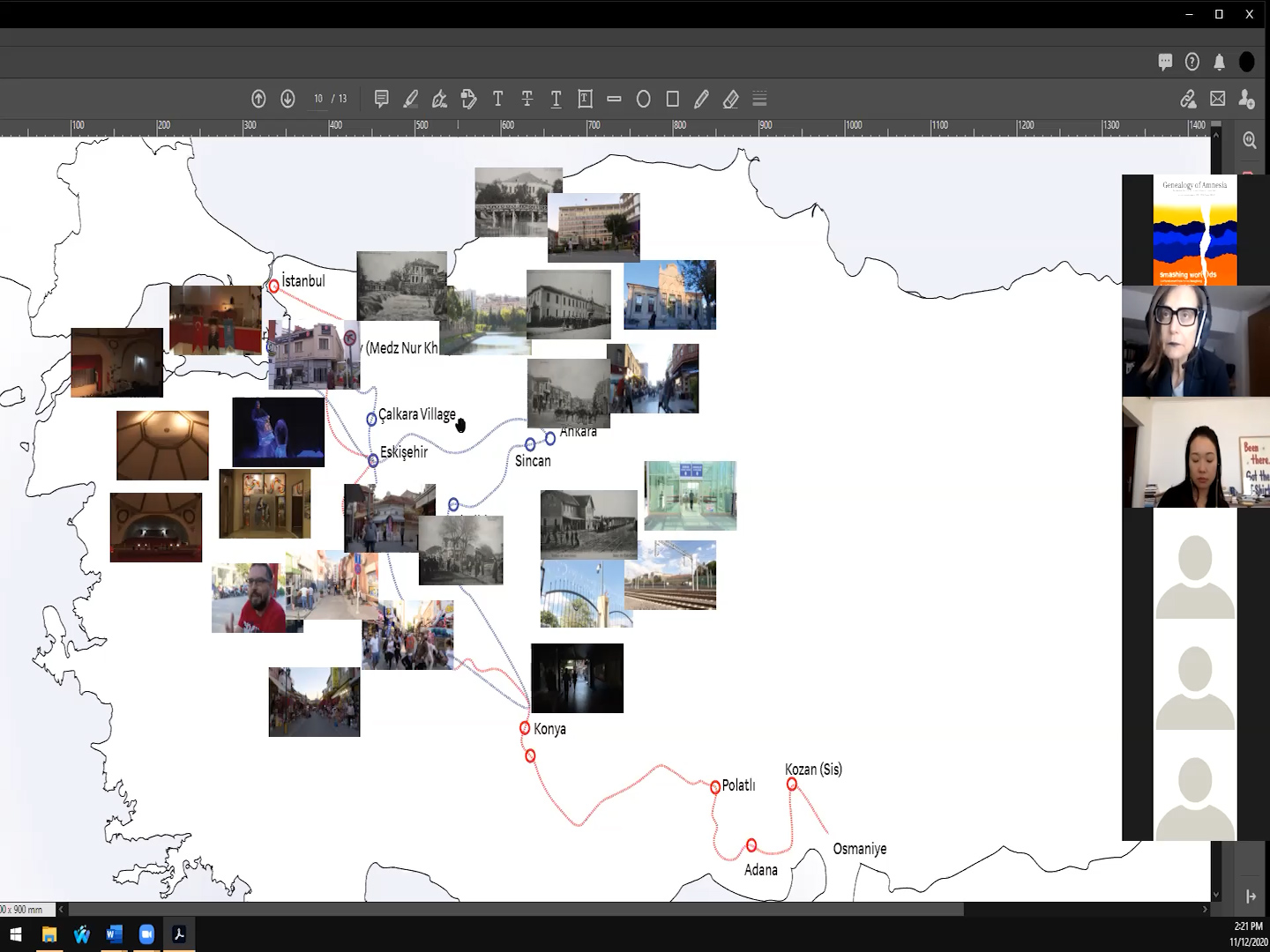
Presentation Iklim Dogan 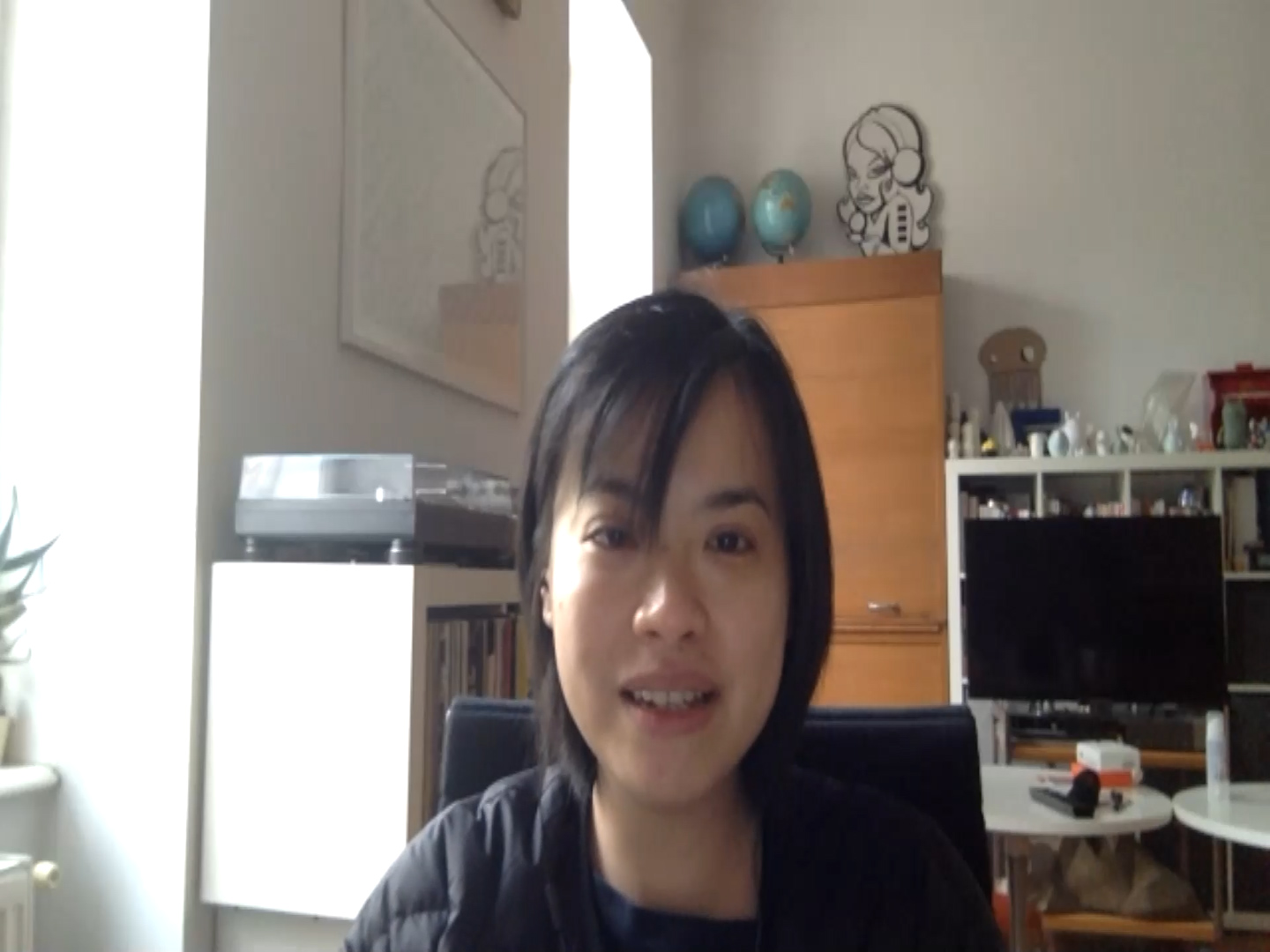
Mai Ling 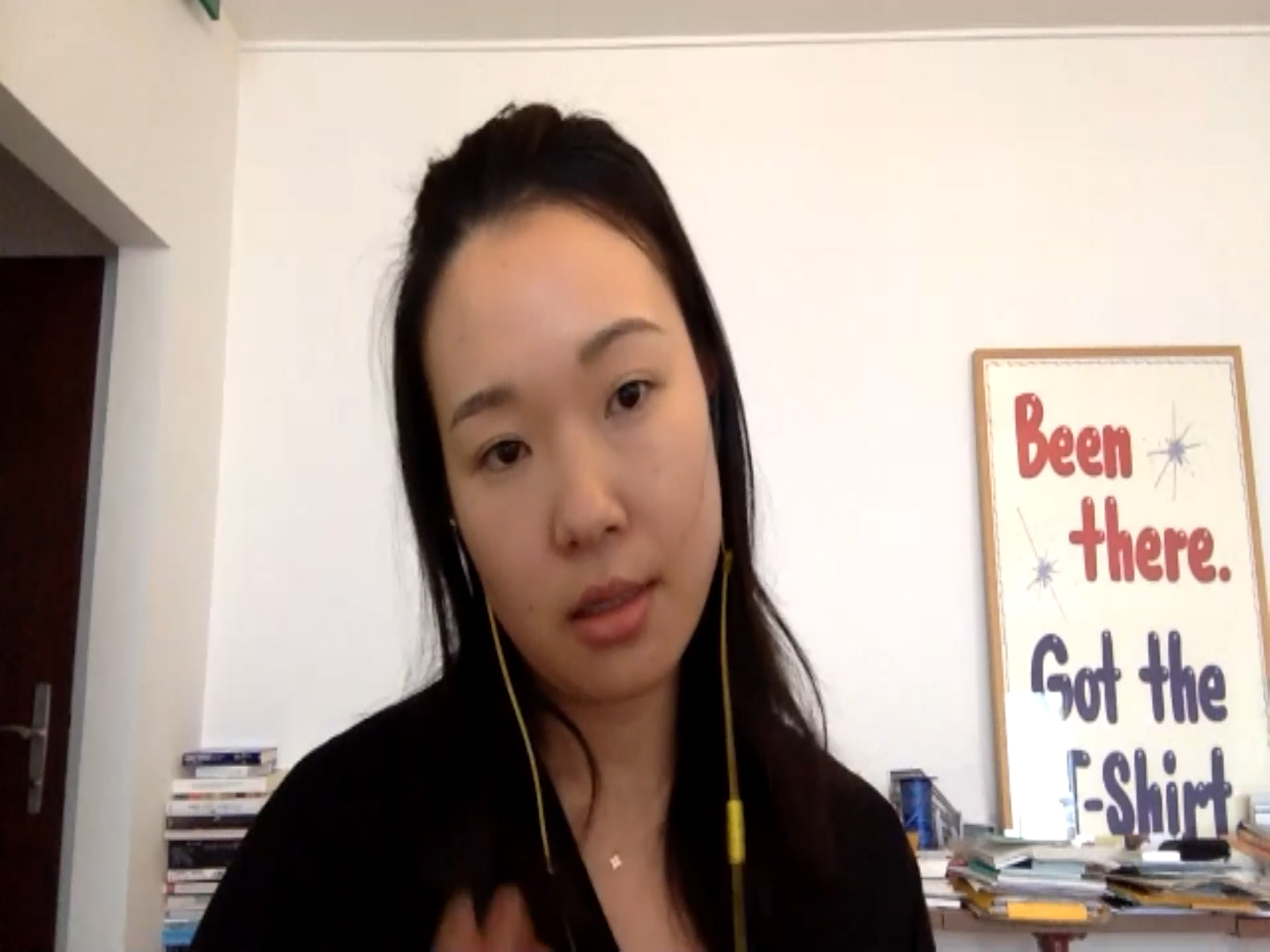
Mika Maruyama 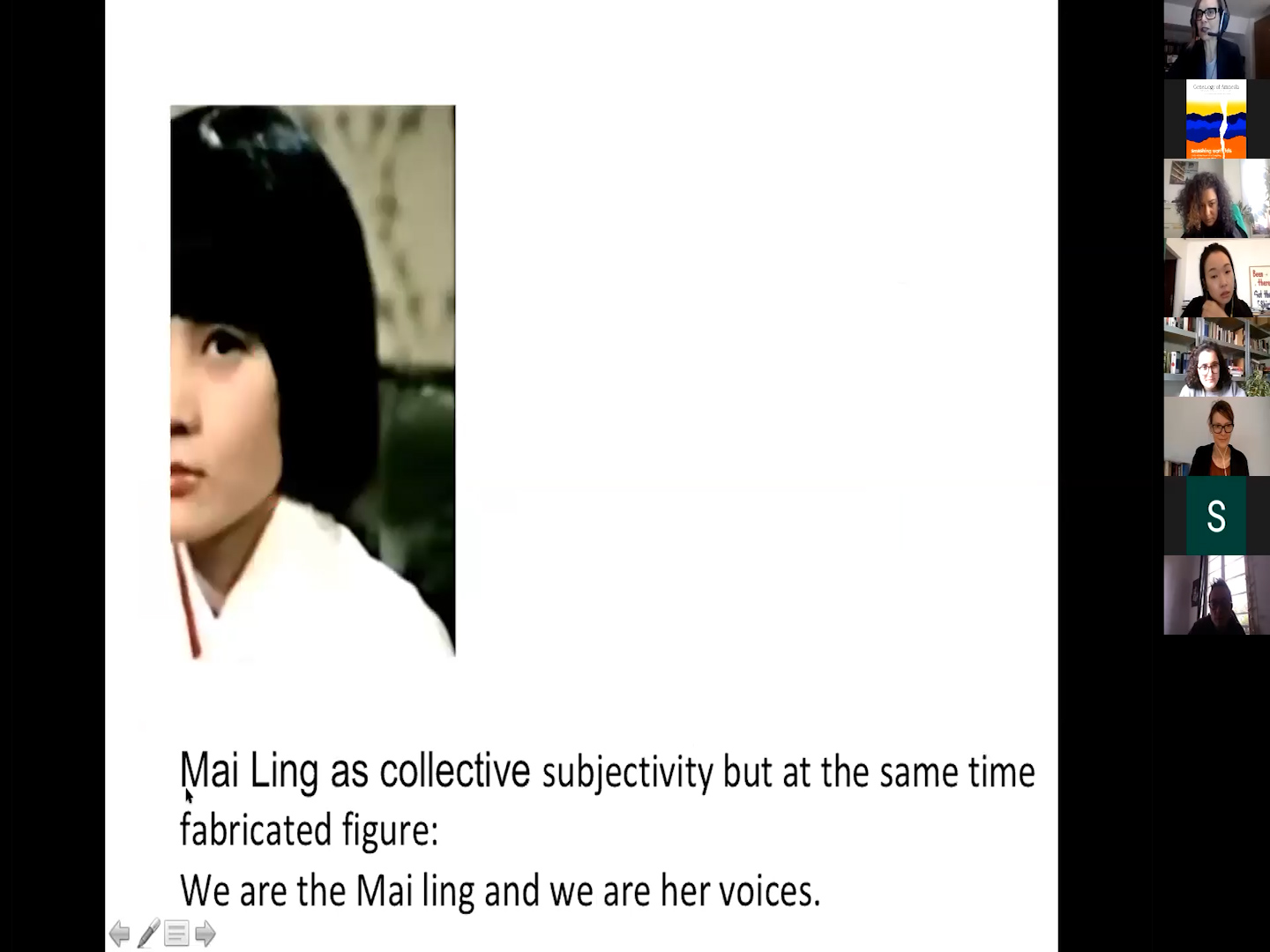
Presentation Mai Ling 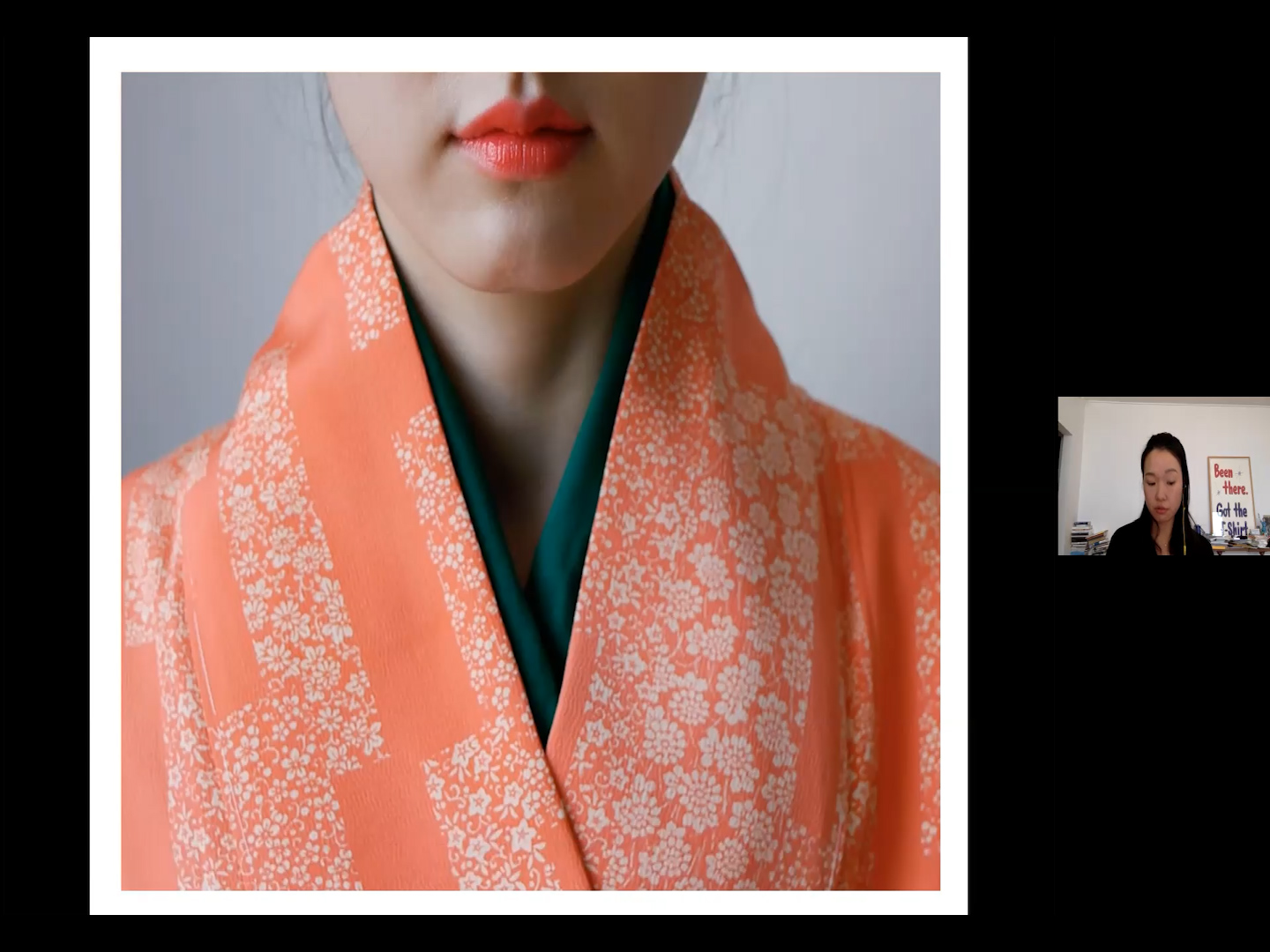
Presentation Mai Ling 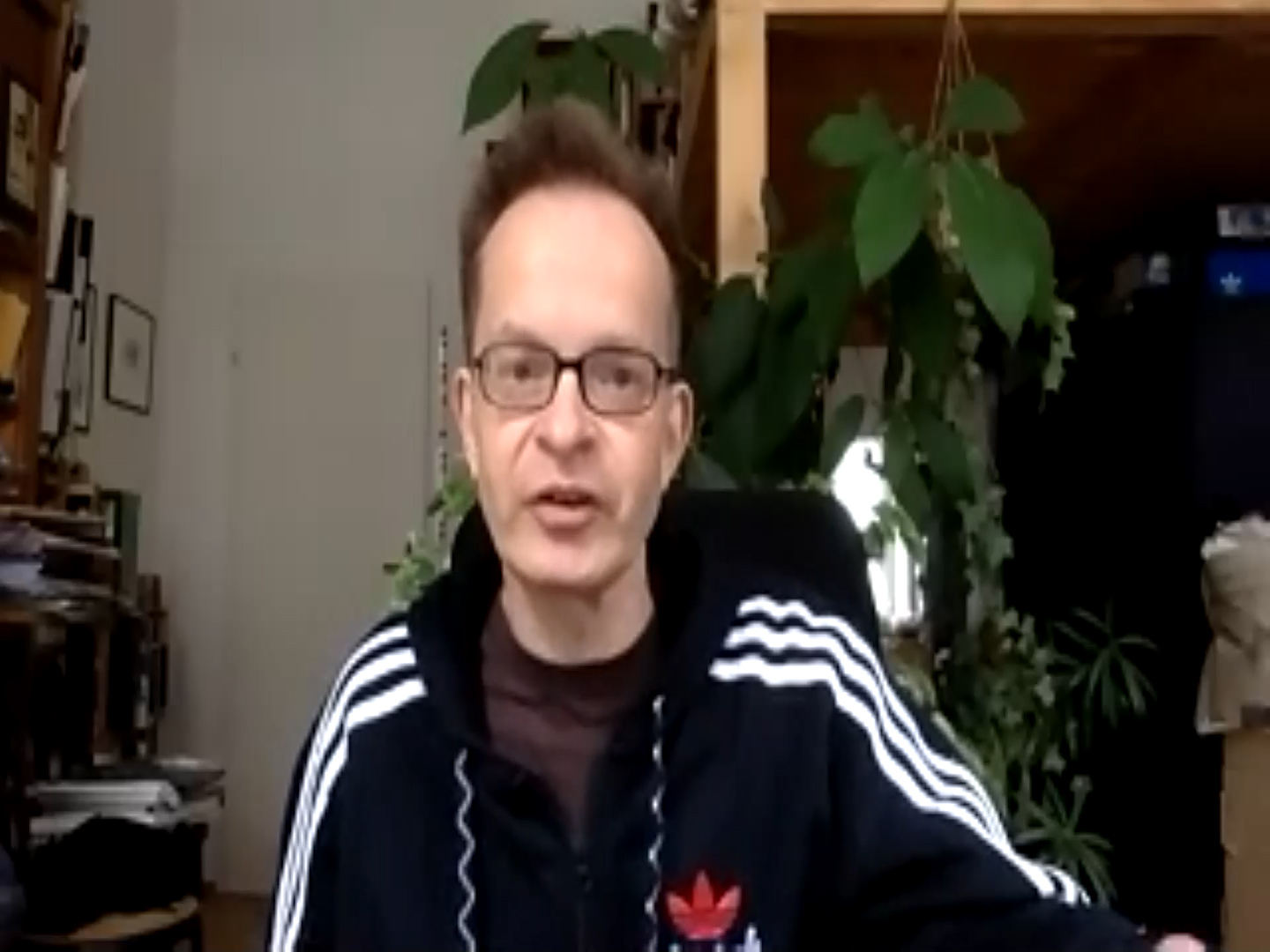
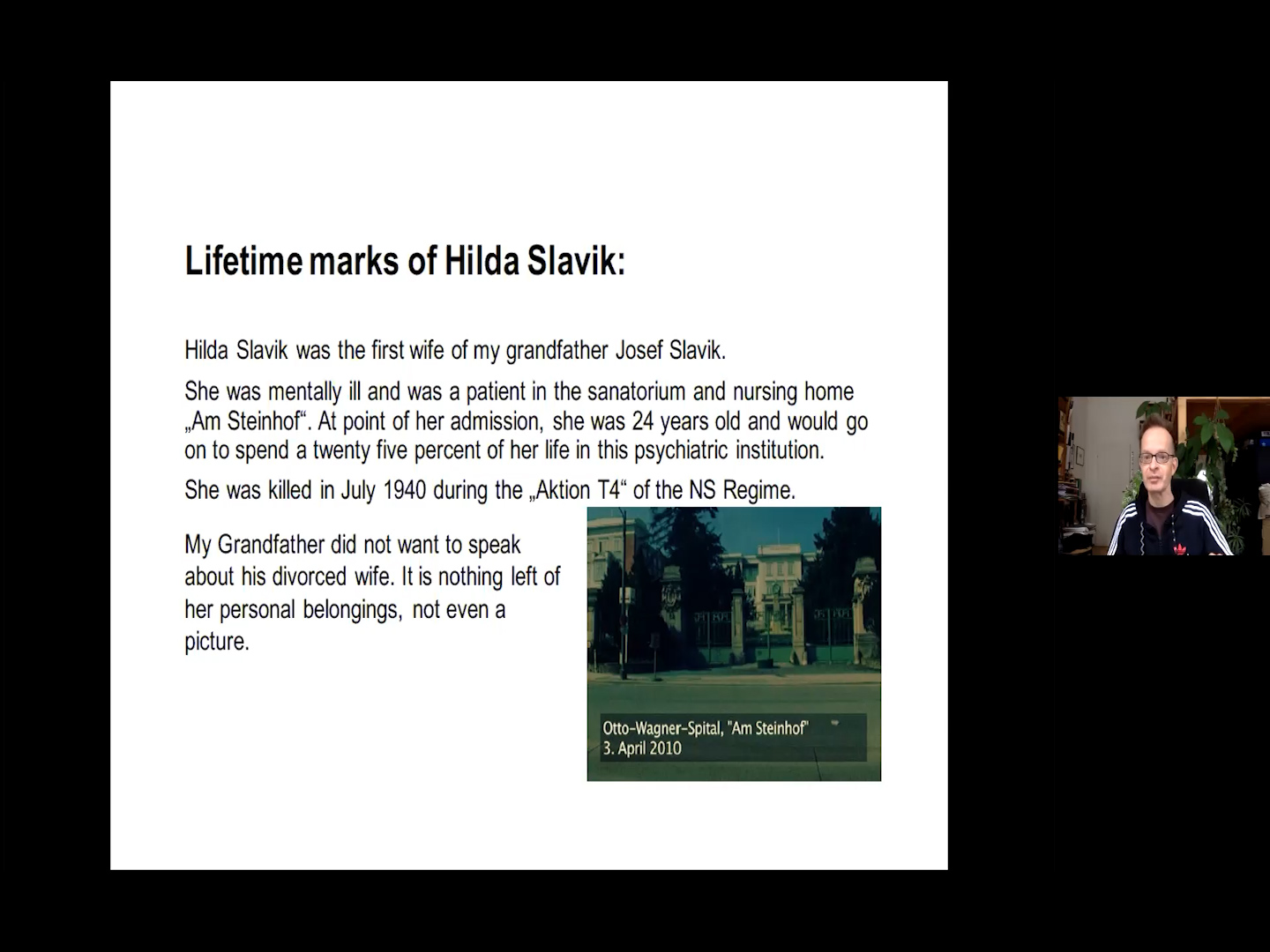
Presentation Christoph Kolar 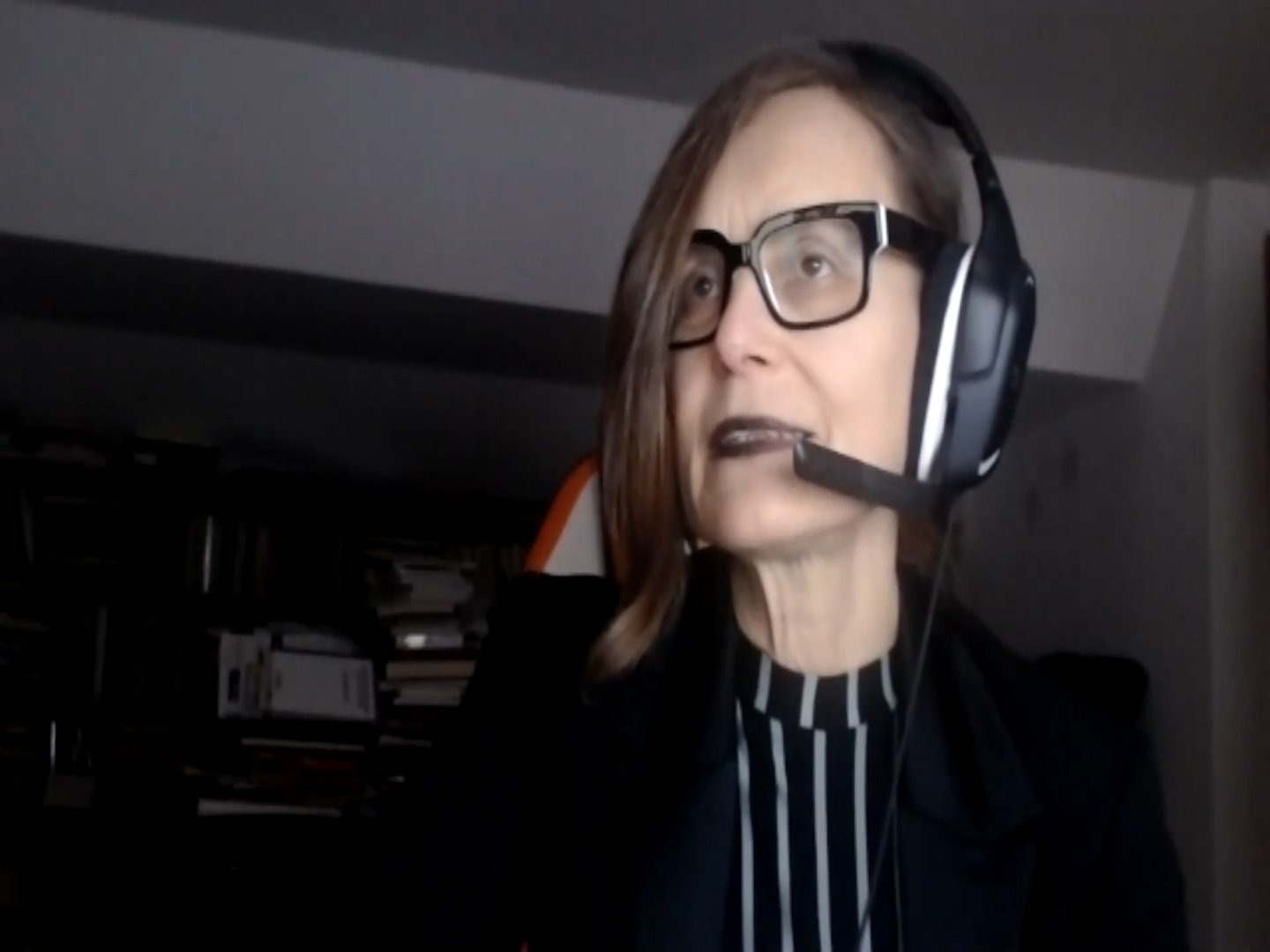
Marina Grzinic 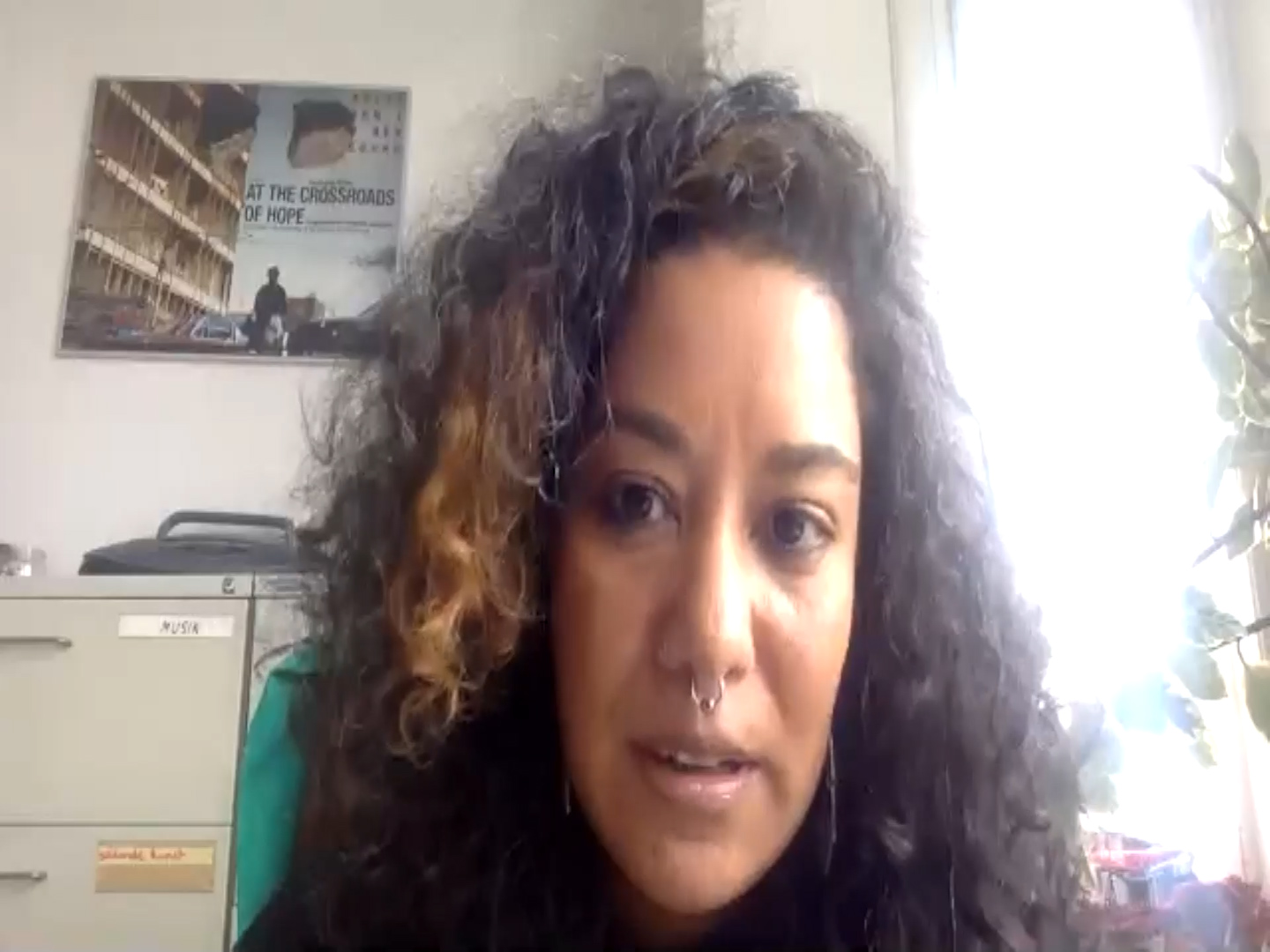
Marissa Lobo
2018: GENEALOGY OF AMNESIA
Crushing Silences, Constructing Histories
International Symposium
mumok – Museum moderner Kunst Stiftung Ludwig Wien
Vienna, November 8 – 10, 2018
Symposium on the silencing of colonialism, anti-Semitism, and contemporary turbo-fascist nationalism in Belgium, Austria, and former Yugoslavia. Re-examining counter-memory and counter-history projects, interventions, and processes of resistance in order to open up spaces for new directions in politics, futurity, and collective struggles.
The international and interdisciplinary symposium, open to public audiences, is built as a podium for research and exchange, dissemination of knowledge, and discussion.
The two-day-long symposium hosted invited speakers that cover the central topics of our research in the three respective territories: memory and history, archives, and the axis of power and knowledge. The general objective of the symposium was to denote gaps between processes of institutionalized silencing, hegemonic processes of oblivion and amnesia, and processes of instituting power through building counter-memory and counter-history projects, interventions, and resistance. The aim was to demonstrate how processes for the establishment of counter-memory and counter-history can open up spaces for new ways of forming radicalized constituent politics. Collective struggles and oppositionality were investigated as the basis of a possible dismantling of neoliberal and necrocapitalist societies by means of re-empowering history that crushes silences.
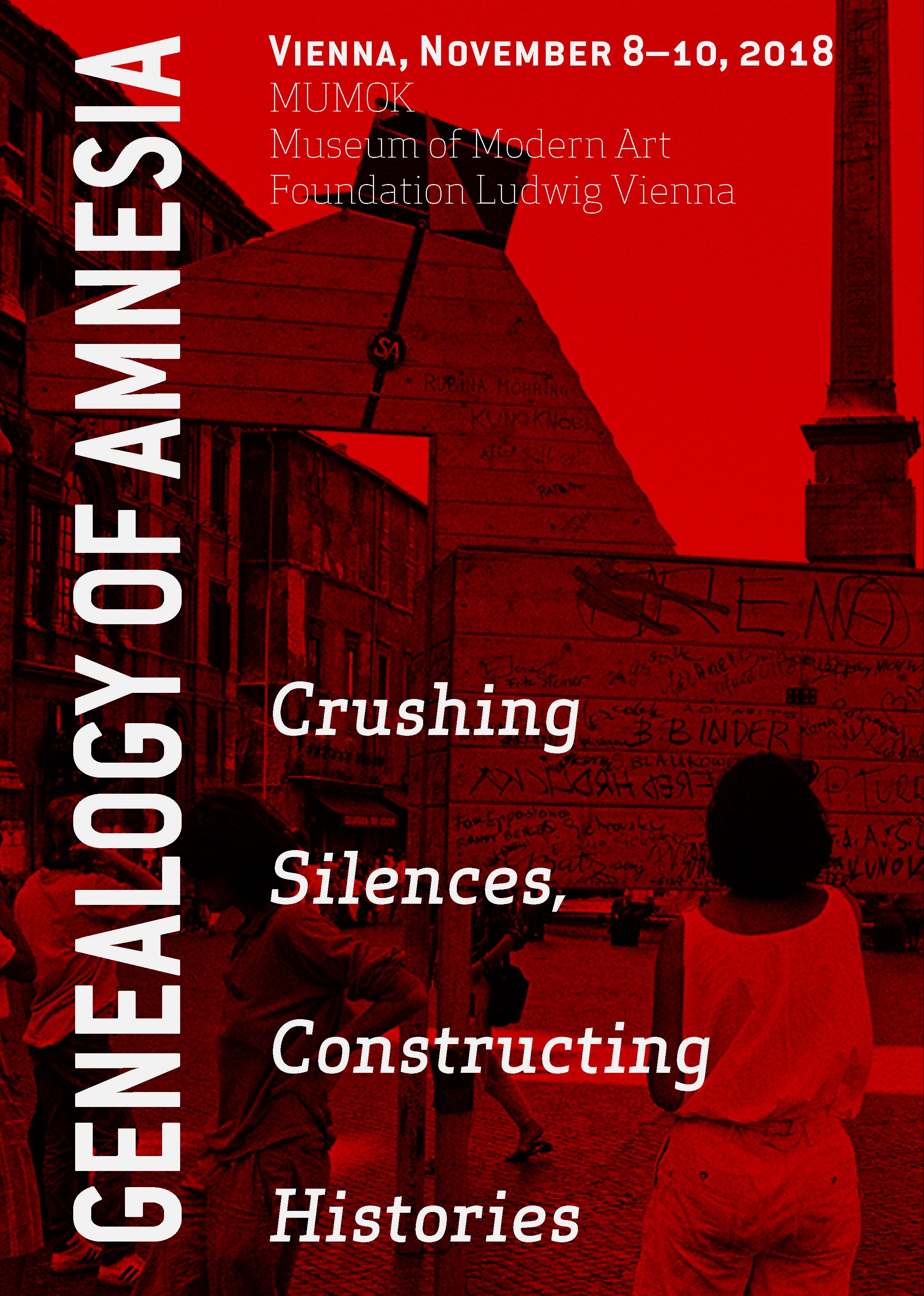
This symposium is organized as part of the arts and theory based research project »Genealogy of Amnesia: Rethinking the Past for a New Future of Conviviality«, funded by the Austrian Science Fund FWF, project number AR439 (2018-2020).
Program
All public events, free admission
Thursday, November 8, 2018
mumok cinema, Museumsplatz 1, 1070 Vienna, basement
5:30 p.m. Inaugural opening of the symposium
Greetings: Eva Blimlinger, Rector of the Academy of Fine Arts Vienna
Introduction: Marina Gržinić, head of the research project “Genealogy of Amnesia,” Academy of Fine Arts Vienna; Sophie Uitz, researcher GoA, Academy of Fine Arts Vienna
6 p.m. Keynote: Gloria Wekker (Utrecht University): A Genealogy of Amnesia in Europe
This talk will draw a map of imperial amnesia in The Netherlands and enlarge it with the ways that White Innocence operates in other Western European nations, and will address different aspects of conviviality.
6:45 p.m. Gloria Wekker in conversation with Birgit Sauer (University of Vienna)
Friday, November 9, 2018
mumok cinema, Museumsplatz 1, 1070 Vienna, basement
10 a.m. Marina Gržinić (Academy of Fine Arts Vienna): Introduction: Burdened by the past, re-thinking the future
Increasingly confronted with a political and social amnesia that draws from the past without any historical context, we have been able to identify a process of de-historicisation and de-politicisation that is exerting great pressure on contemporary art and culture. This process is taking present day Europe as its hostage. The result is amnesia, oblivion, forgetting, and an inability to any relationship with the past.
10:45 a.m. Collectif Mémoire Coloniale et Lutte contre les Discriminations (Brussels): The Challenges of De-Colonial Movements – The Afrodescendants Facing the Colonial Denial and the Mutations of the Colonial Propaganda in Belgium
The rise of a new generation of Afrodescendants in Belgian society who are calling for an end to Belgian colonial paternalism and attainment of a citizenship that will be respected, is creating a fundamental movement in Belgian society, forcing the political system to adapt.
11:45 a.m.–12:15 p.m. coffee break
12:15 p.m. Sophie Lillie (Vienna): The Burden of Proof. How Neglect, Ineptness and Anti-Semitism Shaped Art Restitution Policies in Post-War Austria
The Mauerbach Collection comprised of about 8,000 individual objects of unknown origin dating from the Holocaust era. Austria did little to identify the rightful owners of these works, responding to restitution too late, too slowly and only under international media pressure. Austria did not inspect the records of its state institutions which documented the systematic removal of artworks from Austrian homes, and instead declared restitution a matter of private rather than public concern.
1–3 p.m. lunch break
3 p.m. Araba Evelyn Johnston-Arthur (Howard University, Washington DC): (Re)membering Resistances in the African Diaspora in post-Nazi Austria as “Counteramnesic Practice”
Moving the silenced protest politics in the African diaspora during the distinct period of the early 1960s into the center of the analysis, the lecture unearths the urgency of “critical remembering” in light of the supressed presences of these marginalised histories.
3:45 – 4:15 p.m. coffee break
4:15 p.m. Filmscreening The Waldheim Waltz (directed by Ruth Beckermann, Austria 2018, 93 min.)
A film about truth and lies or “alternative facts”. About individual and collective consciousness.
6 p.m. Ruth Beckermann (Vienna) in conversation with Michael Loebenstein (Austrian Filmmuseum Vienna)
Saturday, November 10, 2018
mumok lounge, Museumsplatz 1, 1070 Vienna, 5th floor
10 a.m. Sefik Tatlić (Academy of Fine Arts Vienna): “New” Fascism. The Aftermath of the Europeanization of Western Balkans and the Necropolitics of Historical Revisionism
This talk analyses “new” racism and fascism in the First World of capital as contemporary iterations of Eurocentric colonial epistemic normative. The talk interprets historical revisionism, the (re)emergence of fascism and necropolitics as parts of the process of structuring necrocapitalist sovereignty on colonial basis.
10:45 a.m. Pedro Monaville (New York University Abu Dhabi): Between Hauntology and Memory Work. The global afterlives of Belgian colonialism
In the context of the history of Belgian colonialism, this talk addresses the questions: Why are conflicts around memory persisting? And how can memory work about the colonial past help us to live together in the 21st century?
11:30 a.m.– 12 noon coffee break
12 noon Keynote: Ruth Wodak (Lancaster University and University of Vienna) and Markus Rheindorf (University of Vienna): Austrian Identity after WWII: Contested Narratives and Lingering Silences
In this talk, we investigate how different contested narratives regarding Austria’s past were constructed and debated in official speeches by politicians at commemorative events from 1995 to 2015.
1–3 p.m. lunch break
3 p.m. Sophie Uitz (Academy of Fine Arts Vienna): Rethinking Politics, Memory and History after Totalitarianism
This talk discusses political dimensions of the distinction between memory, remembrance, and history, as proposed by Hannah Arendt in the context of her studies on totalitarianism. Writing historically about something one does not want to conserve demands that the analysis of the past is tied to the faculty of understanding, and to anticipating and imagining new futures.
3.45 p.m. Max Silverman (University of Leeds): Palimpsestic Memory, Ethics and Performance
In this talk I will discuss transcultural memory in relation to ethics and performance. If a new ethics of memory must accommodate how we are bound to others’ voices, memory as performance means that individuals and communities also actively redefine themselves through this interaction.
4:30–5 p.m. coffee break
5 p.m. Nejra Nuna Čengić (New Europe College Bucharest): What Happened, Happened!
Contrasting the ubiquity of speech about the 1992-1995 war in the media space of Bosnia and Herzegovina to the prevalent silence about this in everyday interactions, this paper investigates how inhabitants of a Sarajevo neighborhood explain silence and speech.
5:45 p.m. Keynote: Shirley Anne Tate (Leeds Beckett University): Love for the Dead: The Libidinal Economy of Post-race Conviviality
This talk explores UK post-race amnesia by looking at the written gifts left at the grave of “Little Black Sambo” by walkers which profess love for the Black long-dead. The discussion looks at how white love can be violent consumption when it erases the fact of Black enslavement in the UK within the necessity for tolerant- deracinated conviviality in our post-race times.
Participants (short bios)
Ruth Beckermann has worked as a writer and filmmaker since 1985, exploring Austria, Judaism, questions of individual background and collective identity, as well as their fractures and ambivalences, on the basis of precise observation.
Nejra Nuna Čengić is a postdoctoral fellow at the New Europe College, Institute for Advanced Studies, Bucharest. Her research interests focus on memory(-ies), speech, violence, and gender relations.
Geneviève Kaninda, Tony Kokou Sampson, and Kalvin Soiresse Njall are activists of the Collectif Mémoire Coloniale et Lutte contre les Discriminations, a decolonial movement, formed by several African associations in Flanders, Brussels and Wallonia. Its main themes are colonial memory and the fight against discrimination, its mission is to uphold a fight for building a decolonial society.
Marina Gržinić is a philosopher, theoretician, and artist from Ljubljana, Slovenia. She has been Professor at the Academy of Fine Arts in Vienna, Austria since 2003. She is head of the FWF-funded research project “Genealogy of Amnesia” (2018–2021).
Araba Evelyn Johnston-Arthur currently teaches at Howard University in Washington DC, where she is also completing her dissertation on resistances in the African Diaspora in Austria.
Sophie Lillie is an independent scholar specializing in the field of pre-war private collecting and patronage in Vienna.
Michael Loebenstein is director of the Austrian Film Museum and served as CEO of the National Film and Sound Archive in Australia from 2011–2016.
Pedro Monaville is assistant professor of history at New York University Abu Dhabi. He received his PhD from the University of Michigan in 2013.
Markus Rheindorf is a lecturer at the Department of Applied Linguistics, University of Vienna, Austria. He is an applied linguist with extensive work on cultural studies and on discourse in politics, the media, and the sciences.
Birgit Sauer is a political scientist, with specializations in Governance and Gender, Gender Politics, Theories of the State and Institutions, and Politics and Emotions. She is Vice Head of the Doctoral Studies Programme at the Faculty of Social Sciences at the University of Vienna. From 2014 to 2017 she was Chair of the Research Platform Gender and Agency at the University of Vienna.
Max Silverman is Professor of Modern French Studies at the University of Leeds. He works on post-Holocaust culture, postcolonial theory and cultures, and questions of trauma, memory, race, and violence.
Shirley Anne Tate is specialized in the areas of institutional racism and black identity. She is the UK’s first Professor of Race and Education, appointed at the Leeds Beckett’s Carnegie School of Education.
Šefik Tatlić is a theorist in the field of political philosophy, decolonial theory, and cultural critique. He holds a PhD in sociology and lives in Bosnia-Herzegovina and Croatia.
Sophie Uitz is a postdoctoral researcher in the “Genealogy of Amnesia” PEEK-project, Academy of Fine Arts Vienna and lecturer at the University of Vienna. She received her PhD in political science from the University of Vienna in 2017.
Gloria Wekker is a social and cultural anthropologist, with specializations in Gender Studies, Sexuality, African-American and Caribbean Studies. She was a professor in Gender Studies at the Faculty of the Humanities, Utrecht University, the Netherlands, and since 2012 she is emerita.
Ruth Wodak is Emerita Distinguished Professor and Chair in Discourse Studies, Lancaster University, UK/ University of Vienna, Austria. She has published widely on identity politics and politics of the past (see http://www.lancaster.ac.uk/linguistics/about-us/people/ruth-wodak for more information).
Conceived and organized by Marina Gržinić and Sophie Uitz
Technical support: Valerija Zabret
Leafleat’s cover page designed by Out of sight.
Special thanks for support and cooperation go to the Academy of Fine Arts Vienna, mumok – Museum moderner Kunst Stiftung Ludwig Wien, and Filmladen Filmverleih.
This symposium is organized as part of the arts and theory based research project »Genealogy of Amnesia: Rethinking the Past for a New Future of Conviviality«, funded by the Austrian Science Fund FWF, project number AR439 (2018-2020).
